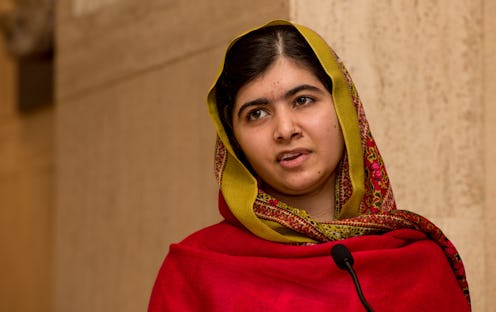News
Malala Yousafzai's Message To Trump About How He Treats Women Is Straight FIRE

Leading Pakistani girls' education advocate Malala Yousafzai has a message for President Donald Trump: Treat all women as you'd want the women closest to you to be treated. Speaking at the Davos Open Forum on Thursday, the women's empowerment activist said she was "disappointed" to see how people in powerful and influential positions like Trump talk about women.
In a discussion with Yousafzai, BuzzFeed's world editor, Miriam Elder, asked the world's youngest Nobel Peace Prize laureate what her message "to someone like Trump, who has his own history — or lack of history — with women's rights" would be. "What kind of message would you want him to hear form you?" Elder asked.
"I just get so disappointed to see that people are at these high positions — and they talk against women, they do not accept women as equal, and they harass women," Yousafzai replied. "It's just shocking for a second to believe that this is actually happening."
While the 20-year-old activist went on to say she hoped women would continue to stand up and speak out against such treatment, she also noted that those holding such antiquated attitudes needed a change of perspective.
"I hope that people who are involved in such shameful things, that they think about their own daughters, their own mothers, and their own close female relatives, and just imagine for a second that — can they let it happen to their daughters, to their sisters, to their mothers?" Yousafzai said. "I don't think they would accept that. So I think they need to look at it from that perspective."
However, Yousafzai was quick to note that she alone can't change anyone. "I can't change a person," she said, adding that she always tries to, at least, give advice. Instead, Yousafzai emphasized the power women have as a collective, saying, "I think it's a time for women to raise up their voice so their voices are heard and their voices reach those ears."
It was a message that echoed something the young activist had said earlier in the interview regarding how women were working to build up a movement. "First we wanted men to do something for us, but that time is gone now," Yousafzai said. "We're not going to ask men to change the world, we're going to do it ourselves. We are going to stand up for ourselves, we are going to raise our voices, and we are going to change the world."
Yousafzai, who has previously described feminism as a "tricky word," also spoke about her own personal journey to becoming a feminist. "I realized that feminism is just another word for 'equality,'" Yousafzai said. "It just means that women should have equal rights as men. ... It's not as complicated as some people have made it." Yousafzai explained she then began to fully embrace feminism, although she notes she had likely become a feminist long before that. "When you speak about women's rights, you become a feminist even if you embrace it or not," she said.
Yousafzai's activism began at an early age. In October 2012, then-15-year-old Yousafzai was an outspoken activist for girls' education in Pakistan when a Taliban gunman shot her in the head as she made her way home from school. She survived the attack, and following specialized treatment in both Peshawar and the United Kingdom, has continued her efforts to fight for increased access to education for girls and women's empowerment.
In 2013, she delivered a powerful speech at the United Nations and founded the Malala Fund. The following year, at 17, Yousafzai became the youngest person to receive the Nobel Peace Prize in recognition of her advocacy work. In 2017, Yousafzai, then 19 years old, became the youngest United Nations Messenger of Peace.
Along with working to make the world a better place for women and girls, Yousafzai is also studying philosophy, politics, and economics at Oxford University.